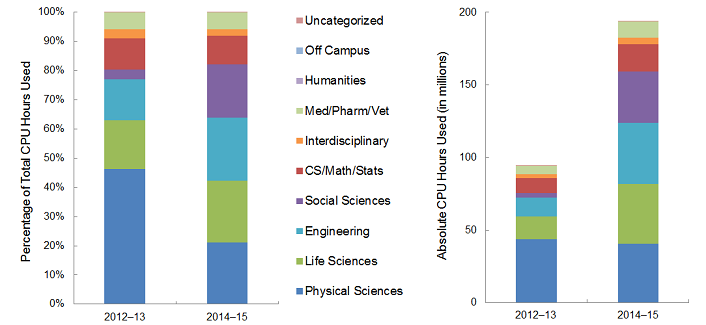Key Takeaways
- Research computing has long catered to researchers in hard sciences and engineering, but the opportunities are expanding for disciplines such as the social sciences and humanities.
- With experience that spans technical field and disciplinary research, an RC facilitator can be an important bridge, benefiting the research infrastructure as well as individual researchers.
The tools and techniques of research computing were developed alongside a set of academic disciplines that for many years were the primary — and sometimes exclusive — users of those technologies. The needs of areas including engineering, the physical sciences, and computer science helped guide the ways research computing came to function and be structured, and the synergy between those "traditional" users and the growing capacities of research computing has led to significant breakthroughs.
At many colleges and universities, efforts are well under way to bring the opportunities of high-performance computing, high-speed data transfer, and storage to other disciplines, including the arts, humanities, and social sciences. Extending research computing to these areas faces some essential challenges, though, including the fact that many of the intended researchers do not have a deep understanding of how research computing can benefit them. Moreover, these new users might have needs that aren't addressed well by the existing methods and tools of research computing.
As described in a new ECAR research bulletin by Lauren Michael and Bruce Maas, the University of Wisconsin–Madison (UW-Madison) created a new role — the research computing facilitator (RC facilitator) — to "[engage] researchers represented in the 'long tail' of computing needs, where potentially significant, compute-enabled transformations to scholarship have yet to be realized." UW-Madison is a member of the NSF-funded Advanced Cyberinfrastructure - Research and Education Facilitators (ACI-REF) network, and the institution's hiring of an RC facilitator was undertaken as part of that collaboration. The university recognized the gaps for "nontraditional" users of research computing and saw an opportunity to provide needed education and support through a dedicated human resource, someone with expertise both in research computing and in academic research methods and teaching. At UW-Madison and other research institutions, RC facilitators "are changing the way that higher education institutions approach research computing" by "helping researchers identify and implement computational approaches that result in the greatest impact to their projects."
The role of RC facilitator potentially gets to the bottom of several important obstacles for research computing outside "the usual" research computing disciplines:
- Understanding research needs: Nontraditional research computing users are likely to have very different needs from those of researchers in the sciences and engineering. Exposing those needs and translating them into the context of research computing requires a dialogue that effective facilitators can enable.
- Different technologies: Pressing existing research computing resources into service in new areas can create a round-peg-in-a-square-hole problem, which can impede progress by discouraging researchers from imagining the full range of possibilities that attend new kinds of computing models. Skillful facilitators can broaden the conversation between academics and computing staff to enable novel solutions.
- Technology fluency: Academics from nontechnical fields likely have far less familiarity — and more uneven knowledge — about computational resources. Facilitators can guide them through an evaluation of the ways research computing can play a role in their research, limiting the intimidation that can be a common response.
- Scholarly expertise: Coming from the other side, research computing staff typically have little expertise in academic domains such as humanities or social sciences, limiting their ability to provide effective guidance to researchers in those areas. An RC facilitator with domain-specific research experience is a valuable bridge between technical and academic groups.
RC facilitators address these needs through a range of activities, including outreach and engagement with researchers, education and training, ongoing support, and advocacy. In the case of UW-Madison, the first RC facilitator was so successful, particularly among users in life sciences and social sciences, that the university hired a second facilitator the next year. As shown in figure 1, the usage of research computing services among previously underrepresented groups increased significantly, both in terms of the proportion of CPU hours dedicated to these groups and in the absolute number of CPU hours used for them. (Humanities, off-campus, and uncategorized research computing are included in the figure, but these three areas combined totaled <1 percent and <100,000 hours of overall CPU usage.)

To learn more about the role of the RC facilitator and the experience at UW-Madison, see the bulletin Research Computing Facilitators: The Missing Human Link in Needs-Based Research Cyberinfrastructure.
Gregory Dobbin is senior editor, Publishing Services, EDUCAUSE.
© 2016 Gregory Dobbin. This EDUCAUSE Review article is licensed under Creative Commons BY-NC-ND 4.0 International.
